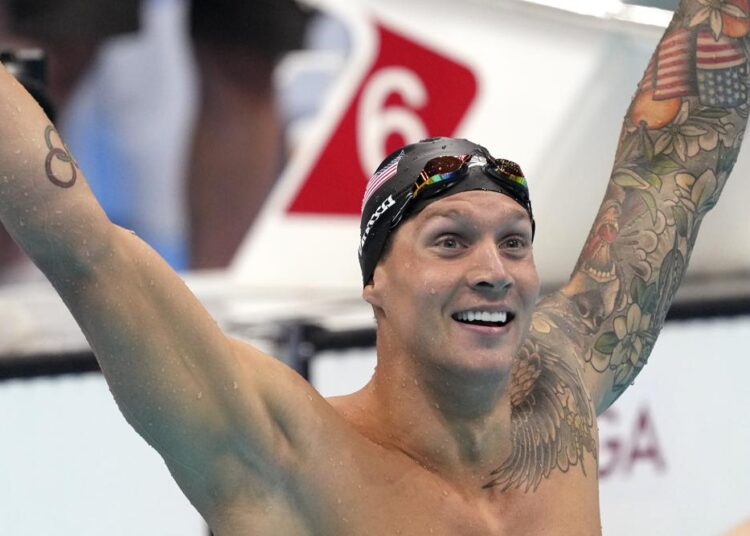TOKYO — Caeleb Dressel climbed atop the lane rope, a look of wonder in his eyes. He gazed all around the Tokyo Aquatics Centre, eager to soak up every last moment of something he’s never done before.
Win an individual gold medal at the Olympics.
The most dominant swimmer of the post-Michael Phelps era filled in the last hole on his resume, winning a gold all by himself with two furious laps of the pool Thursday.
Dressel, whose three previous golds were all on relays, lived up to the hype at an Olympics where several U.S. stars have faltered.
“I knew that weight was on my shoulders,” he said after a nail-biting victory in the 100-meter freestyle over defending champion Kyle Chalmers of Australia.
Katie Ledecky got another shot at Ariarne Titmus, but this time neither won gold. China knocked off both the Americans and the Australians with a world-record performance in the 4×200-meter freestyle relay.
All three teams went faster than the previous mark, but it was China that earned the second world record of the Tokyo Games despite a blistering anchor leg from Ledecky.
“I wasn’t as nervous maybe and knew I was going to let it go and go for it each lap of that race,” said Ledecky, who went faster than anyone but couldn’t quite catch the Chinese, winding up with her second silver of the Games.
Dressel was golden. As is his style, the 24-year-old Floridian dived into the pool and popped out of the water with the lead. He was still ahead at the lone flip, and grittily turned away Chalmers’ bid for a second straight gold.
Dressel’s winning time was an Olympic record of 47.02 seconds — a mere six-hundredths ahead of Chalmers, who had to settle for a silver this time.
“I wasn’t worried about anything,” Dressel said. “During the race there’s only so much you can do. Whatever’s going to happen is going to happen. I stuck to my race plan so if it got me first, OK, if it got me second, OK.”
The two have developed quite a rivalry. Chalmers won at the 2016 Rio de Janeiro Games, where Dressel was sixth, but the American won the last two world championships, with Chalmers finishing second in 2019.
“We do enjoy racing against each other and we do bring the best out of each other,” Chalmers said. “It’s almost a relief to get it done with now.”
The bronze was claimed by Russian swimmer Kliment Kolesnikov (47.44), who added to his silver in the 100 backstroke.
The first three gold medals of Dressel’s career were all in the relays — two in Rio, another in the 4×100 free relay at the Tokyo Games.
Now, he’s got one of his own.
“It is a lot different. I guess I thought it would be, I just didn’t want to admit to it,” he said. “It’s a lot tougher. You have to rely on yourself, there’s no one to bail you out.”
After Phelps retired, Dressel emerged as the world’s dominant swimmer. He turned in staggering performances at the last two world championships, earning seven gold medals at Budapest in 2017, followed by a six-gold, two-silver performance at Gwangju in 2019.
As important as those meets were, they’re not the Olympics. Dressel knew he needed an individual gold to solidify his legacy.
From his perch on the lane rope, he cherished the significance of his victory.
“These moments are a lot different than worlds,” Dressel conceded.
Dressel’s gold was the second of the morning for the Americans, who got a surprise victory from Bobby Finke in the Olympic debut of the men’s 800 free.
Also winning golds: Australia’s Izaac Stubblety-Cook in the men’s 200 breaststroke and China’s Zhang Yufei in the women’s 200 butterfly.
Zhang returned to swim a leg on the 4×200 free relay, joining Yang Junxuan, Tang Muhan and closer Li Bingjie for a winning time of 7:40.33.
That broke the previous record of 7:41.50 set by Australia at the 2019 world championships.






Discussion about this post